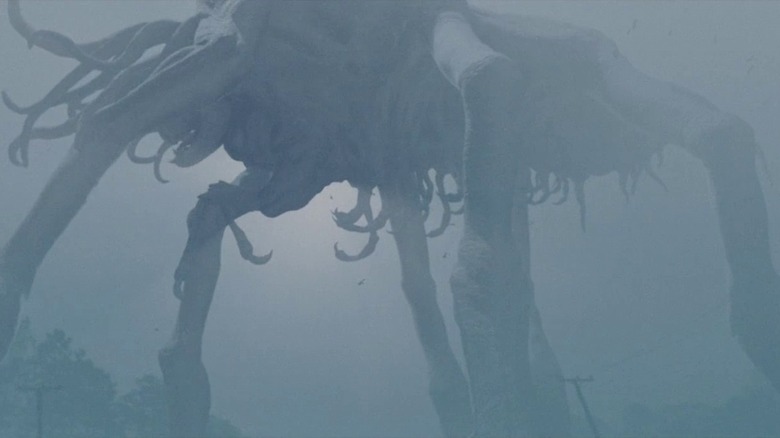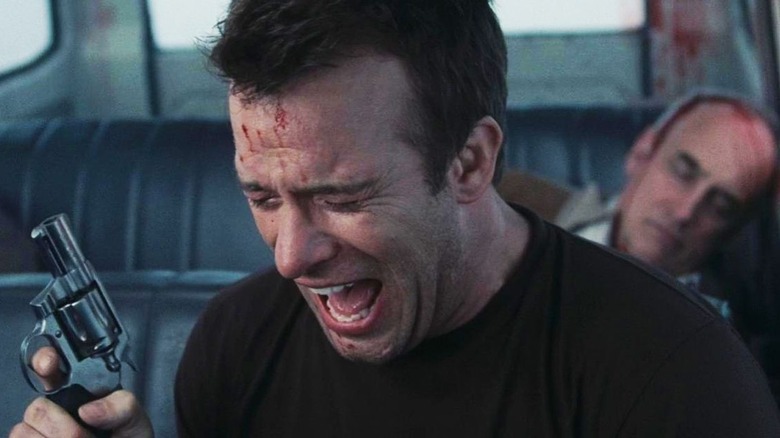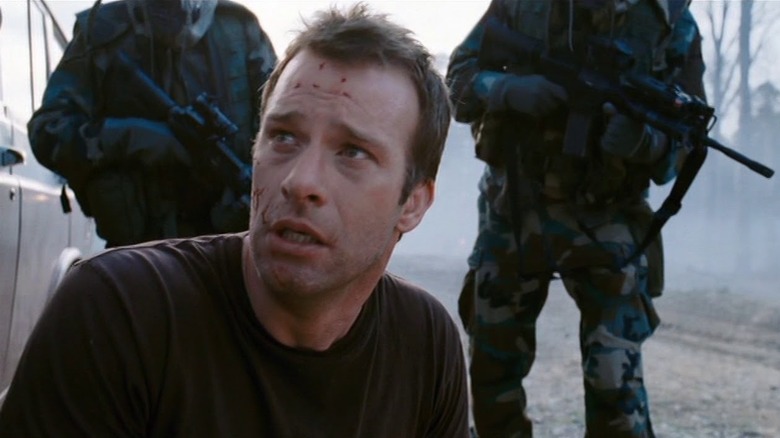The Mist Ending Explained: 14 Years Later, The Ending Still Hits Like A Gunshot
Very few times in a career watching and analyzing horror movies do you come across a mainstream film with a true bone-rattler of an ending, but that's exactly what happened when director Frank Darabont released "The Mist" on November 21, 2007, almost exactly 14 years ago. It was Darabont's fourth time adapting a work by Stephen King for the screen after "The Shawshank Redemption," "The Green Mile" and his very first major short film "The Woman in the Room."
The novella on which it is based first appeared in the Viking Press supernatural horror anthology book "Dark Forces" in 1980, and later in King's own 1985 collection "Skeleton Crew." It concerns a man and his son who go to a supermarket after a freak thunderstorm only to wind up trapped inside along with other townspeople after an eerie mist envelops the town. Then the monsters start coming out of the mist, and the frightened citizens inside the market slowly descend into irrational mob violence.
It was first adapted by ZBS Foundation as a binaural audio drama in 1984, which is still widely available today and stars William Sadler in the Thomas Jane role of David Drayton. Sadler later played Jim Grondin in the movie. Spike TV later produced a 2017 TV series based on the story also titled "The Mist," which was canceled after 10 episodes.
I personally remember attending the first NYC press screening for "The Mist" and how well it played throughout. People cheered like mad when Toby Jones' Ollie Weeks shoots fundamentalist lunatic Mrs. Carmody (the incredible Marcia Gay Harden). A man behind me screamed "IT'S CTHULHU!!!" when we see The Behemoth (also known as "The Impossibly Tall Creature") show up towards the end. But it is the very end that really shook people up.
What Happens...
In the original novella, the character of David (Jane), his son Billy (Nathan Gamble), new friend (they sleep together in the story) Amanda Dunfrey (Laurie Holden), as well as two older townspeople Irene (Frances Sternhagen) and Dan (Jeffrey DeMunn) ride in a car away from the horrors of the supermarket to discover a New England devastated by the creatures from another dimension let loose by the sinister Arrowhead Project. That story simply stops after they see the Behemoth and without David knowing for certain that his wife is dead. They continue down the fog-shrouded road with a faint radio signal blurting the word "Hartford," providing some glimmer of hope, but it is more or less ambiguous what becomes of them or the world at large.
Having acquired the rights to "The Mist" around the same time as "Shawshank" and originally hoping to make it his feature directorial debut, Darabont decided that the movie conclusion needed a little more "ooomph." The first big change was having David drive by his home and find his wife Stephanie (Kelly Collins Lintz) dead, cocooned by a spider. They drive on, see The Behemoth, and then keep driving until they are out of gas. Demoralized to the point where they have lost all hope, David uses the gun he got from Ollie to kill his son, Amanda, Irene, and Dan. Since he only had four bullets he is unable to kill himself, so — crazed with fear and the sudden loss of his son — he exits the car and screams for the monsters to come and kill him.
Something emerges from the mist, but it is not a monster ... it is a military tank. More tanks follow with armed soldiers wielding flamethrowers. The mist begins to clear and David realizes that if he had waited five more minutes he, his son, and his friends would have been saved.
But that is not the true knife through the heart. To understand the most symbolic aspect of the ending you have to mentally rewind to early on in the crisis when an unnamed woman played by Darabont's future "Walking Dead" star Melissa McBride asks for someone in the supermarket to leave and walk home with her so she can get her two kids. Crippled by fear of the horrors that await outside, no one volunteers, not even David. Flash forward to the end, and one of the passengers onboard a rescue truck being escorted by the army is that very woman, holding her two children to her. It's an extra dagger to show that fear is, in many ways, an illusion. With only the best of intentions, David tries throughout the story to protect his son from harm, but by ultimately giving in to fear, he destroyed his life.
The King's Seal of Approval
Way back in 2007 Stephen King — who rarely makes junket appearances to promote films based on his work — came out to support Darabont and let it be known that he especially appreciated the "Twilight Zone"-style moralizing ending. King made a statement during that press conference (via First Showing) that went a little something like this:
"Frank wrote a new ending that I loved. It is the most shocking ending ever and there should be a law passed stating that anybody who reveals the last 5 minutes of this film should be hung from their neck until dead."
Years later in 2016, Darabont talked about getting the master's approval and what the ending meant to him to Yahoo!:
"He read it and said, 'Oh, I love this ending. I wish I'd thought of it.' He said that, once a generation, a movie should come along that just really pisses the audience off, and flips their expectations of a happy ending right on the head. He pointed to the original 'Night Of The Living Dead' as one of those endings that just scarred you. And it felt OK to me! On balance, it seems like, thematically, it's a pretty good companion piece to 'Shawshank,' in a weird way. Because if 'Shawshank' is the movie about the value of hope, then 'The Mist' becomes a movie about the danger of hopelessness. And believe me, I knew that it was going to be one of those endings that people either really dug, or really hated. I was OK with that, because I think that at the end of the day, we should be willing to go either direction. It shouldn't always be about making the audience love you and about pandering to their approval."
King himself echoed this statement the following year, also to Yahoo!:
When Frank was interested in 'The Mist,' one of the things that he insisted on was that it would have some kind of an ending, which the story doesn't have — it just sort of peters off into nothing, where these people are stuck in the mist, and they're out of gas, and the monsters are around, and you don't know what's going to happen next. When Frank said that he wanted to do the ending that he was going to do, I was totally down with that. I thought that was terrific. And it was so anti-Hollywood — anti-everything, really! It was nihilistic. I liked that. So I said you go ahead and do it. The critics and fans both kind of excoriated him for that. And now, when you read retrospective pieces about 'The Mist,' people are, 'Wow, that's one of the great ones.' They like it. They just had to get used to it.


